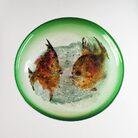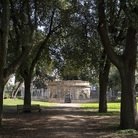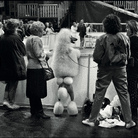Ravi Agarwal. Ecologies of Loss

© Ravi Agarwal | Ravi Agarwal, Have you seen the flowers on the river?, stampe fotografiche, 2007
From 8 March 2019 to 9 June 2019
Turin
Place: PAV - Parco Arte Vivente
Address: via Giordano Bruno 31
Times: friday 03-06pm; saturday and sunday 12-07pm
Responsibles: Marco Scotini
Ticket price: full 4 euro, reduced 3 euro
Telefono per informazioni: +39 011 3182235
E-Mail info: info@parcoartevivente.it
Official site: http://www.parcoartevivente.it
On Friday 8th March 2019, PAV Parco Arte Vivente will present Ecologies of Loss, the first Italian solo exhibition of the Indian artist Ravi Agarwal. Curated by Marco Scotini, this exhibition continues his investigation into the relationship between artistic practices and ecological thought in the Asian continent, begun with the solo exhibition of the Chinese artist Zheng Bo Weed Party III. This investigation (around which there will soon be other events), wants to take stock of the “centrality of Asia in the climate crisis” as claimed by Amitav Ghosh.
As one of the major exponents of the Indian art scene, Ravi Agarwal has, for decades, lead an inter-disciplinary practice as an artist, photographer, environmental activist, writer and curator. His work explores vital questions of the contemporary era such as, ecology, society, urban and rural spaces, and capital. For more than forty years, photography has been the preferred element in Ravi Agarwal’s work and this has subsequently experienced a more extended dimension thanks to the inclusion of installations, video, public art interventions, and diaries within projects lasting several years.
The decentralized nature of his approach (plural, fractal, polyphonic), places Ravi Agarwal amongst those exponents of a nomadic science (Deleuze and Guattari) who act against unitary, theoretical examples in favor of lesser, fragmentary and local forms of knowledge. Moved by the desire to take back control of autonomous, collective powers subtracted from capitalism, self-management and self-government, and cooperation in human and extra-human labor, Agarwal records the ongoing changes in the environment, beginning from the side of the losses. This results in the exhibition’s title, Ecologies of Loss, created for the PAV.
In this sense, given that this is his first solo exhibition in Italy, it tries to bring together nuclei of works chronologically disposed over the years: from Have you Seen the Flowers on the River(2007-2010) to Extinct? (2008), from Alien Waters (2004-2006) to Else All Will Be Still (2013-2015). Within these extensive areas of research, the loss of animals (the community of vultures in the southern part of Asia) is no different to the threat of extinction for the Indian carnation crops (its sustainable economy and significant rituals), the loss of the Yumana River from that of language (with recourse to ancient Sangam literature written in Tamil), through the loss of the subjective self – in accordance with a logic of ecosystemic interconnections by means of which, no one element can be isolated from the others.
However, the fundamental and original aspect of Ravi Agarwal’s artistic and activist work is that which has been variously defined as “personal ecology” since 2002, when his work was presented at Documenta and when the subject of ecology was still not on the agenda. Rather than “personal ecology”, it might be more correct to define it, with a derivation from Foucault, as “technologies of the self” or, in other words, as the implication of one’s own autobiography within the environment, as an indissociable component of it. For this reason, the environment cannot be solely natural but must also be psychological, social, linguistic, semiotic, etc. From this point of view, the work presented at the Yinchuan Biennale is particularly emblematic. Its title, Room of the Seas and Room of Suns, refers to two areas of the artist’s life connected by the common element of sand. Two ecological contexts, two survival policies: the damp landscape of the coastal city of Pondicherry and the arid Rajasthan desert, of his infancy and his ancestors. As Agarwal claims, the river is not only a body of water that runs through the city, but a network of thousands of relationships interconnected with it, its inhabitants and with nature.
His works have been displayed in international exhibitions, amongst which are the Yinchuan Biennale (2018), the Kochi Biennale (2016), the Sharjah Biennial (2013) and Documenta XI (2002).
Ravi Agarwal is the founder and director of the environmental NGO Toxic Link, as well as being part of a number of regulatory committees alongside his continuous studio, research and writing activities in relation to the subjects linked to environmental sustainability, both within academia and the more popular media. In 2008, he was awarded the United Nations Special Recognition Award for Chemical Safety and, in 1997, the Ashoka Fellowship for Social Entrepreneurship.
The exhibition has been staged with the support of the Compagnia di San Paolo, the Fondazione CRT, the Regione Piemonte and the City of Turin.
Within the initiatives planned for the exhibition, PAV Educational and Training Activities proposes Un prato in città (A grassland in the city), laboratory which examines the Tagete flower (Tagetes L. - also known as marigold) conformation and properties from an easthetic, formal and scientific point of view. From this special flower it is extracted a precious healing essential oil is extrated by this special flower; with its bright colours, this oil attracts bees and butterflies and in Indian culture it is offered to celebrate unions, holidays and rituals as a symbol of well-being and prosperity.
As one of the major exponents of the Indian art scene, Ravi Agarwal has, for decades, lead an inter-disciplinary practice as an artist, photographer, environmental activist, writer and curator. His work explores vital questions of the contemporary era such as, ecology, society, urban and rural spaces, and capital. For more than forty years, photography has been the preferred element in Ravi Agarwal’s work and this has subsequently experienced a more extended dimension thanks to the inclusion of installations, video, public art interventions, and diaries within projects lasting several years.
The decentralized nature of his approach (plural, fractal, polyphonic), places Ravi Agarwal amongst those exponents of a nomadic science (Deleuze and Guattari) who act against unitary, theoretical examples in favor of lesser, fragmentary and local forms of knowledge. Moved by the desire to take back control of autonomous, collective powers subtracted from capitalism, self-management and self-government, and cooperation in human and extra-human labor, Agarwal records the ongoing changes in the environment, beginning from the side of the losses. This results in the exhibition’s title, Ecologies of Loss, created for the PAV.
In this sense, given that this is his first solo exhibition in Italy, it tries to bring together nuclei of works chronologically disposed over the years: from Have you Seen the Flowers on the River(2007-2010) to Extinct? (2008), from Alien Waters (2004-2006) to Else All Will Be Still (2013-2015). Within these extensive areas of research, the loss of animals (the community of vultures in the southern part of Asia) is no different to the threat of extinction for the Indian carnation crops (its sustainable economy and significant rituals), the loss of the Yumana River from that of language (with recourse to ancient Sangam literature written in Tamil), through the loss of the subjective self – in accordance with a logic of ecosystemic interconnections by means of which, no one element can be isolated from the others.
However, the fundamental and original aspect of Ravi Agarwal’s artistic and activist work is that which has been variously defined as “personal ecology” since 2002, when his work was presented at Documenta and when the subject of ecology was still not on the agenda. Rather than “personal ecology”, it might be more correct to define it, with a derivation from Foucault, as “technologies of the self” or, in other words, as the implication of one’s own autobiography within the environment, as an indissociable component of it. For this reason, the environment cannot be solely natural but must also be psychological, social, linguistic, semiotic, etc. From this point of view, the work presented at the Yinchuan Biennale is particularly emblematic. Its title, Room of the Seas and Room of Suns, refers to two areas of the artist’s life connected by the common element of sand. Two ecological contexts, two survival policies: the damp landscape of the coastal city of Pondicherry and the arid Rajasthan desert, of his infancy and his ancestors. As Agarwal claims, the river is not only a body of water that runs through the city, but a network of thousands of relationships interconnected with it, its inhabitants and with nature.
His works have been displayed in international exhibitions, amongst which are the Yinchuan Biennale (2018), the Kochi Biennale (2016), the Sharjah Biennial (2013) and Documenta XI (2002).
Ravi Agarwal is the founder and director of the environmental NGO Toxic Link, as well as being part of a number of regulatory committees alongside his continuous studio, research and writing activities in relation to the subjects linked to environmental sustainability, both within academia and the more popular media. In 2008, he was awarded the United Nations Special Recognition Award for Chemical Safety and, in 1997, the Ashoka Fellowship for Social Entrepreneurship.
The exhibition has been staged with the support of the Compagnia di San Paolo, the Fondazione CRT, the Regione Piemonte and the City of Turin.
Within the initiatives planned for the exhibition, PAV Educational and Training Activities proposes Un prato in città (A grassland in the city), laboratory which examines the Tagete flower (Tagetes L. - also known as marigold) conformation and properties from an easthetic, formal and scientific point of view. From this special flower it is extracted a precious healing essential oil is extrated by this special flower; with its bright colours, this oil attracts bees and butterflies and in Indian culture it is offered to celebrate unions, holidays and rituals as a symbol of well-being and prosperity.
SCARICA IL COMUNICATO IN PDF
COMMENTI

-
 Dal 12 July 2025 al 24 November 2025
Venezia | Museo del Vetro
Dal 12 July 2025 al 24 November 2025
Venezia | Museo del Vetro
-
 Dal 11 July 2025 al 21 September 2025
Roma | Loggia dei Vini - Villa Borghese
Dal 11 July 2025 al 21 September 2025
Roma | Loggia dei Vini - Villa Borghese
-
 Dal 10 July 2025 al 10 August 2025
Roma | Palazzo Esposizioni Roma
Dal 10 July 2025 al 10 August 2025
Roma | Palazzo Esposizioni Roma
-
 Dal 10 July 2025 al 3 November 2025
Casale Marittimo | Bolgheri, Castagneto Carducci, Casale Marittimo
Dal 10 July 2025 al 3 November 2025
Casale Marittimo | Bolgheri, Castagneto Carducci, Casale Marittimo
-
 Dal 4 July 2025 al 21 September 2025
Roma | Palazzo Bonaparte
Dal 4 July 2025 al 21 September 2025
Roma | Palazzo Bonaparte
-
 Dal 28 June 2025 al 21 September 2025
Roma | Palazzo Bonaparte
Dal 28 June 2025 al 21 September 2025
Roma | Palazzo Bonaparte


